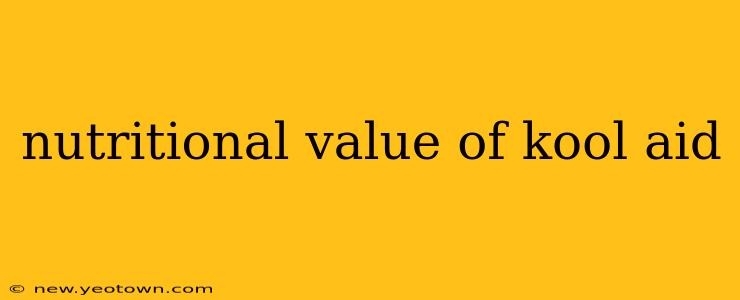Kool-Aid: A Sweet Treat, But Is There Any Nutritional Value?
Let's be honest, Kool-Aid isn't exactly known for its nutritional powerhouse status. It's a nostalgic drink, synonymous with childhood summers and backyard barbeques, but the vibrant colors and sweet taste often overshadow any discussion of its nutritional content. This article delves into the nutritional value (or lack thereof) of Kool-Aid, answering some frequently asked questions and providing a balanced perspective.
What are the main ingredients in Kool-Aid?
The core ingredients of Kool-Aid are typically sugar, artificial sweeteners (in some varieties), artificial flavors, and food coloring. The exact mix varies slightly depending on the flavor, but the fundamental components remain consistent. This immediately highlights the primary issue: Kool-Aid's nutritional value is largely absent. It provides minimal, if any, vitamins, minerals, or essential nutrients.
Does Kool-Aid contain any vitamins or minerals?
The short answer is: Not significantly. While some fortified versions might include trace amounts of certain vitamins, these are usually negligible in comparison to the high sugar content. Relying on Kool-Aid for essential nutrients would be misguided. Think of it more as an occasional treat than a health beverage.
Is Kool-Aid bad for your teeth?
Yes, Kool-Aid’s high sugar content significantly contributes to tooth decay. The sugar feeds bacteria in the mouth, which produce acids that erode tooth enamel. The acidity of Kool-Aid itself can also wear away enamel. Regular consumption can lead to cavities and other dental problems. Moderation and proper oral hygiene are crucial if you choose to consume Kool-Aid.
What are the health risks associated with drinking Kool-Aid?
The most significant health risk is associated with its high sugar content. Excessive sugar intake links to various health problems, including weight gain, type 2 diabetes, heart disease, and other metabolic disorders. The artificial sweeteners and food coloring in some varieties also raise concerns, although research on their long-term effects is still ongoing and often debated within the scientific community.
Is Kool-Aid hydrating?
While Kool-Aid contains water, the high sugar concentration can actually hinder its hydrating properties. High sugar intake can lead to dehydration, negating any potential hydration benefits from the water content. Plain water remains the best choice for hydration.
How can I make Kool-Aid healthier?
If you enjoy the taste of Kool-Aid but are concerned about the sugar content, consider these alternatives:
- Reduce the amount of powder: Use less Kool-Aid powder per serving to decrease the sugar content.
- Add water: Diluting the drink with extra water will also reduce sugar concentration.
- Use a sugar substitute: Some sugar-free or reduced-sugar versions of Kool-Aid are available, using artificial sweeteners instead of sugar.
- Make your own homemade version: You can create a healthier alternative by using natural fruit juices and sweeteners like honey or maple syrup in moderation.
Conclusion:
Kool-Aid is a treat, not a nutritional source. While it offers a sweet and refreshing taste, its nutritional value is minimal, and its high sugar content poses potential health risks. Moderation is key, and healthier alternatives exist if you crave the flavor without the negative consequences. Prioritizing whole foods and water for hydration and essential nutrients will always be a more beneficial approach to a healthy lifestyle.

